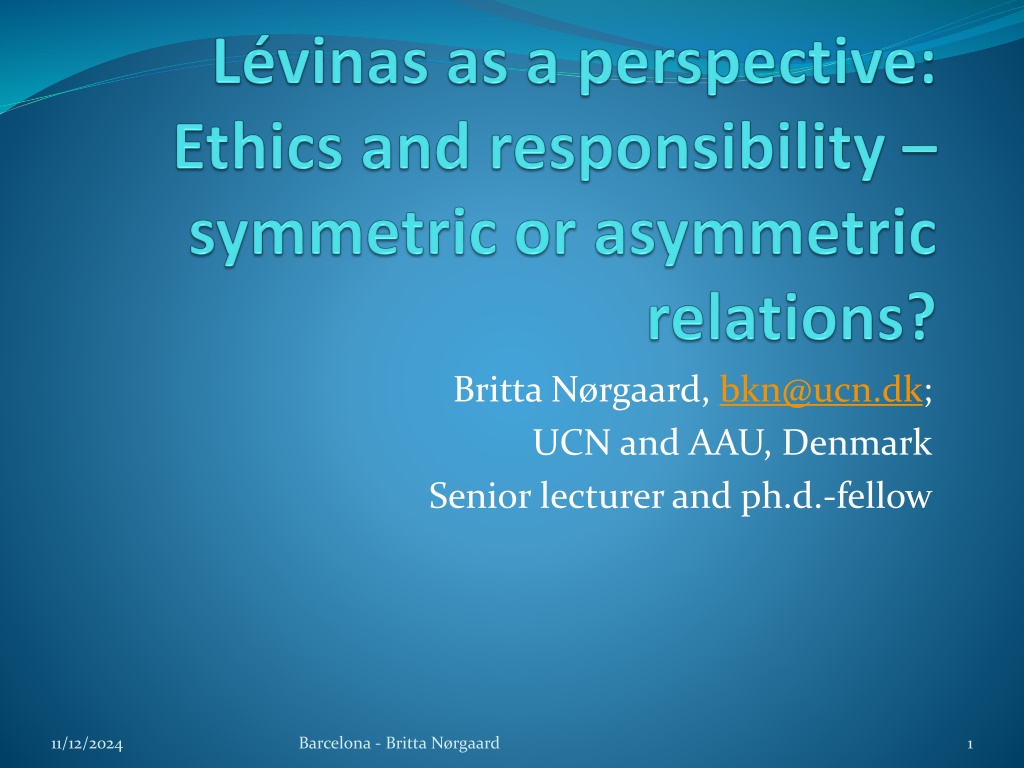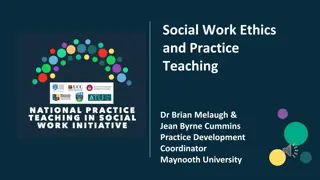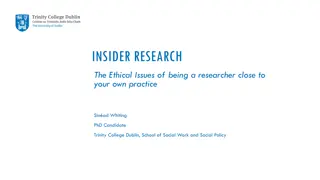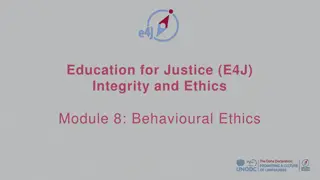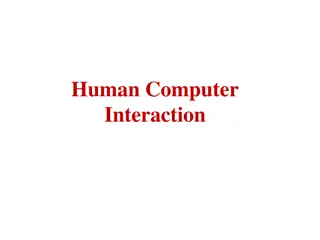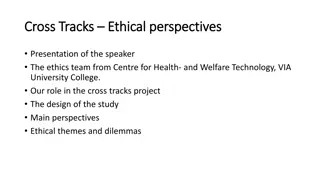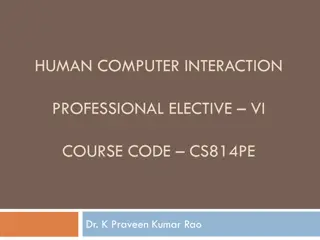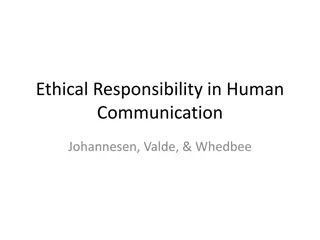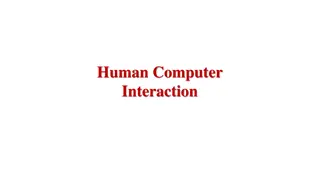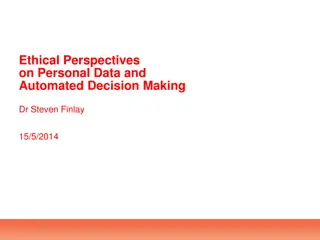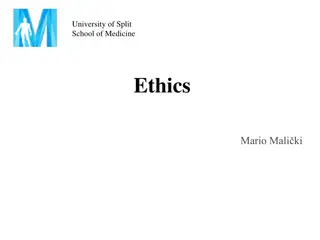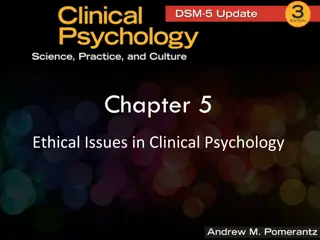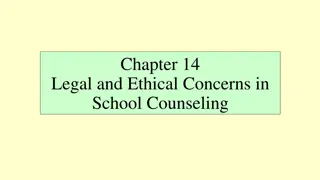Perspectives on Human Interaction and Ethical Engagement in Professional Practice
Explore the profound insights of thinkers like Emmanuel Levinas in examining human relationships and ethical obligations within professional contexts. Through real-life examples, delve into the dynamics of symmetry and asymmetry in caregiving scenarios, shedding light on the nuances of empathy, responsibility, and genuine dialogue.
Download Presentation

Please find below an Image/Link to download the presentation.
The content on the website is provided AS IS for your information and personal use only. It may not be sold, licensed, or shared on other websites without obtaining consent from the author. Download presentation by click this link. If you encounter any issues during the download, it is possible that the publisher has removed the file from their server.
E N D
Presentation Transcript
Britta Nrgaard, bkn@ucn.dk; UCN and AAU, Denmark Senior lecturer and ph.d.-fellow 11/12/2024 Barcelona - Britta N rgaard 1
Emmanuel Lvinas 1906 1995 Born in Lithuania French Citizen apres vous , Other - otherness Well known in many countries hardly in Denmark Ethics, phenomenology 11/12/2024 Barcelona - Britta N rgaard 2
Denmark K.E.L gstrup: ethical demand Martin Buber: philosopherof meeting Differences and similarities L vinas - extreme humanism The professional field with myauthenticexamples somewords: peoplewith severeaquired brain damages + other impairments 11/12/2024 Barcelona - Britta N rgaard 3
Example 1 in a Lvinas-perspective A professional (social educator and nurse) says: I feel better here at work, because I actually bring them home (meaning she is worried about the citizens when she is in her private home) when I am here I feel we are equal but when I am driving towards home oh, I really pity her ( one specific woman), what a fate, and I am not thinking like that while I am here. Then we are equal and we have a dialogue. L vinas might say: Being a hostage Is it that obvious how the roles are related to symmetry and asymmetry? 11/12/2024 Barcelona - Britta N rgaard 4
Example 2 in a Lvinas perspective One fine morning I observe the social educator and a man, Peter, with severe brain damage, sitting cozily next to each other. She reads the newspaper aloud to him, and he sits relaxed with a smile in his face. Elsa finds small pieces of news and read them out aloud. He smiles and makes small comments, and you can see that he is observant and follows her. Then Elsa asks if she should read a certain part, and Peter says that he probably would not have chosen that part. She reads anyway. Soon after they finish the reading, and Peter says thank you, it has been nice - but he had never read the newspaper that thoroughly himself, he said. L vinas: symmetryor asymmetry in favorof whom? 11/12/2024 Barcelona - Britta N rgaard 5
Example 3 in a Lvinas perspective A social educator; Elsa, sits next to a woman, Lene, in a wheel chair without any verbal language and with very low arousal and almost without mobility in her hands. This woman indicates interest in a certain activity, and I observe the social educator holding Lene s hand, touching her arm and imitating the movements trying to decorate a small box with a color, chosen by Lene. I am so close that I can hear Lene s breathing. After this small activity lasting perhaps 8 minutes I ask Elsa how she could know what Lene wanted. It had been difficult, Elsa said, and she also found it difficult to explain it to me. 11/12/2024 Barcelona - Britta N rgaard 6
About example 3 Language can be understood in manyways alsoas bodylanguage Skin Sound Touching Breath Importantaccording to L vinas: being perhaps a track of the womanwhoexisted before the brain damage an ethical communicativeevent saying 11/12/2024 Barcelona - Britta N rgaard 7
Example 4 A woman, Dorte, with brain damage is dependent on the professional in doing her rituals in the bath. The professional, Elsa, has to be ready for the next task outside the room at a certain time and she asks Dorte to hurry up. Dorte starts crying and as a result she has a bad start of the day and she asks the professional to leave. Dorte is sad, and Elsa is sad and feels so bad about the situation, that she later on discusses this with the manager, expressing critique about the structure and about how her work as a professional is organized. 11/12/2024 Barcelona - Britta N rgaard 8
The professional role apres vous Ethics Responsibility Openness Creativity Giving the other the precedence Respecting the Otherand Otherness Being aware of the face of the Other mirroring others with e.g. disability Being aware of language in all shades mirroring being and saying Ability to dechipher very small signals and gestures 11/12/2024 Barcelona - Britta N rgaard 9
Lvinas ideal demands? How to learn and develop this presence, openness and alertness? Teaching and education questioning as ethical intrusion unlike the Socraticway Is it possible to work like this? Is it more a question of calling than a professional work in a modern world based on formal education? How to maintain yourautonomy? Doesa modern tendency to individualization in society constitutea barrier for working like this? 11/12/2024 Barcelona - Britta N rgaard 10
Lvinas some further perspectives Totalityand infinity L vinas nightmare: important to be able to maintain openness and not cling to diagnosis, categories, standards in the professional work and in the administrative and political systems How to avoid sameness ? L vinas can make us thoughtful and more reflecting on the apparently truism of symmetryand asymmetry in professional and other - relations 11/12/2024 Barcelona - Britta N rgaard 11
